Today's Top Picks

Emergency Response Strategies for Autonomous Vehicle Incidents
Autonomous vehicles can face rare situations that they are not fully programmed to handle. Because their driving mistakes differ from those of humans, first responders must adjust their tactics accordingly. In support of first responders and public safety, the Texas Department of Transportation commissioned guidelines and procedures for autonomous vehicle-related incidents.

Securing U.S. Food & Agriculture’s Critical Supply Chains
Although one of the nation’s 16 critical infrastructure sectors, the food and agriculture sector has long trailed others in resilience. With globalized supply chains and vital ties to preparedness and stability, this lag is untenable. Disruptions—from cyberattacks to disasters and trade shocks—highlight its fragility and security risks.

Hidden Assets and Ready Relationships
Every community has unique strengths and resources. Trusted community members, local leaders, and volunteers can support existing community systems to amplify response and recovery efforts. Enhanced communication through local volunteers builds trust and helps communities know how and where response and recovery efforts are being conducted.
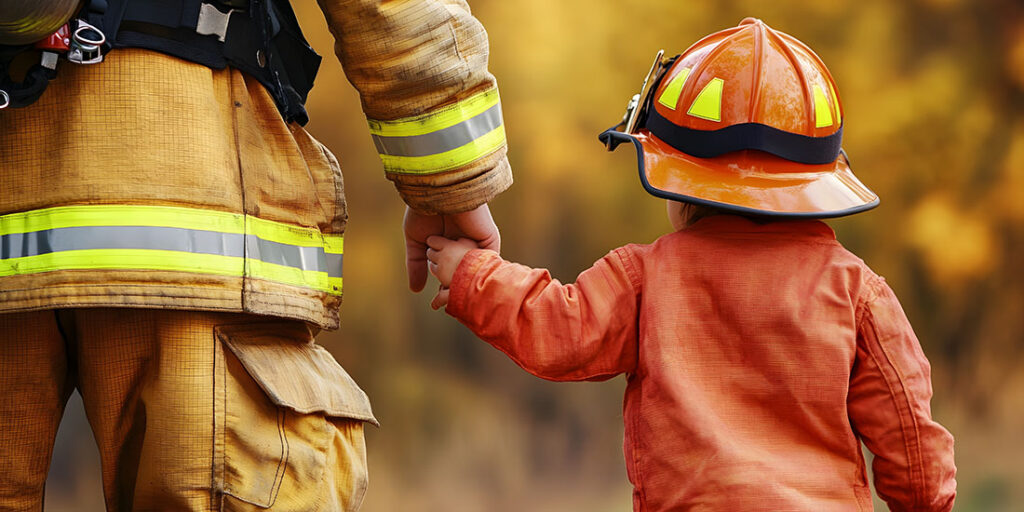
From Finger Paint to Flamethrowers: Life Lessons Learned in Kindergarten
In the fast-moving world of emergency response, a few seconds can mean life or death. Responders count on tough training, cutting-edge tools, and solid knowledge of science and safety. However, the roots of effective response are actually learned in kindergarten.
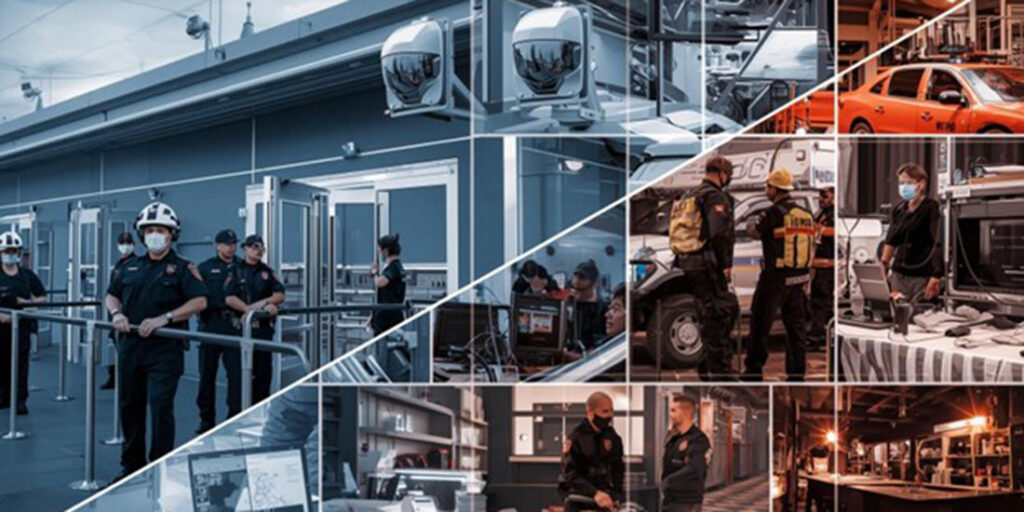
Emergency Management on Defense, Homeland Security on Offense
While some professionals believe that emergency management should revisit civil defense roles in emergency management, others support maintaining a separation between homeland defense and emergency management roles. This article is a counterpoint to the creation of a “Sixth Framework” for emergency management.
Trending
 FIFA, Terrorism, and Preparedness for the 2026 World… by Adam Johnson The quadrennial championship of the most popular game in the world—soccer—is coming to the United States in 2026, and fans…
FIFA, Terrorism, and Preparedness for the 2026 World… by Adam Johnson The quadrennial championship of the most popular game in the world—soccer—is coming to the United States in 2026, and fans… Preparing Small Communities for Terrorist Attacks by Rodney Andreasen Terrorist attacks have broad psychological, social, and economic impacts that often extend beyond the initial target. While large cities are…
Preparing Small Communities for Terrorist Attacks by Rodney Andreasen Terrorist attacks have broad psychological, social, and economic impacts that often extend beyond the initial target. While large cities are… The Evolving Landscape of Domestic Extremism by Richard Schoeberl Extremism in its many forms remains a growing threat in the U.S. There is heightened concern about ongoing violent extremist…
The Evolving Landscape of Domestic Extremism by Richard Schoeberl Extremism in its many forms remains a growing threat in the U.S. There is heightened concern about ongoing violent extremist…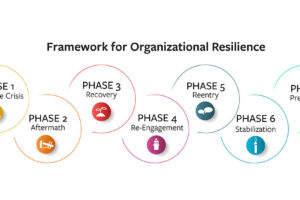 A Seven-Phase Framework for Organizational Resilience by Michelle Colosimo Organizations cannot always dictate the course of a crisis—whether an incident, active threat, or natural disaster—but they can shape their…
A Seven-Phase Framework for Organizational Resilience by Michelle Colosimo Organizations cannot always dictate the course of a crisis—whether an incident, active threat, or natural disaster—but they can shape their…Trending
 The Evolving Landscape of Domestic Extremism by Richard Schoeberl Extremism in its many forms remains a growing threat in the U.S. There is heightened concern about ongoing violent extremist…
The Evolving Landscape of Domestic Extremism by Richard Schoeberl Extremism in its many forms remains a growing threat in the U.S. There is heightened concern about ongoing violent extremist… A Seven-Phase Framework for Organizational Resilience by Michelle Colosimo Organizations cannot always dictate the course of a crisis—whether an incident, active threat, or natural disaster—but they can shape their…
A Seven-Phase Framework for Organizational Resilience by Michelle Colosimo Organizations cannot always dictate the course of a crisis—whether an incident, active threat, or natural disaster—but they can shape their… FIFA, Terrorism, and Preparedness for the 2026 World… by Adam Johnson The quadrennial championship of the most popular game in the world—soccer—is coming to the United States in 2026, and fans…
FIFA, Terrorism, and Preparedness for the 2026 World… by Adam Johnson The quadrennial championship of the most popular game in the world—soccer—is coming to the United States in 2026, and fans… Preparing Small Communities for Terrorist Attacks by Rodney Andreasen Terrorist attacks have broad psychological, social, and economic impacts that often extend beyond the initial target. While large cities are…
Preparing Small Communities for Terrorist Attacks by Rodney Andreasen Terrorist attacks have broad psychological, social, and economic impacts that often extend beyond the initial target. While large cities are…Trending
FIFA, Terrorism, and Preparedness for the 2026 World… by Adam Johnson The quadrennial championship of the most popular game in the world—soccer—is coming to the United States in 2026, and fans…
Preparing Small Communities for Terrorist Attacks by Rodney Andreasen Terrorist attacks have broad psychological, social, and economic impacts that often extend beyond the initial target. While large cities are…
The Evolving Landscape of Domestic Extremism by Richard Schoeberl Extremism in its many forms remains a growing threat in the U.S. There is heightened concern about ongoing violent extremist…
A Seven-Phase Framework for Organizational Resilience by Michelle Colosimo Organizations cannot always dictate the course of a crisis—whether an incident, active threat, or natural disaster—but they can shape their…
Domestic Preparedness Journal
Featured in this issue
- Volunteers—A Necessary Force Multiplier
- Hidden Assets and Ready Relationships
- Volunteers and Emergency Management Budgets
- Indigenous Emergency Response in Canada
- Civil Defense: The Unseen Pillars of Preparedness
- The United Cajun Navy and Industry Partnerships
- Emergency Management and Homeland Security
- Life Lessons Learned in Kindergarten
- A Free Mental Health Resource
- Overcoming Hurricane Evacuation Delays
- Podcast – CERT and Community Preparedness
- Podcast – Leading in Times of Disaster
- Podcast – Partnerships in Preparedness
Articles Out Loud

Article Out Loud – Hidden Assets and Ready Relationships
September 24, 2025
This is an article by Judy Kruger and Paul Purcell, an Article Out Loud from Domestic Preparedness, September 24, 2025.

Article Out Loud – From Finger Paint to Flamethrowers, Life Lessons Learned in Kindergarten
September 24, 2025
This is an article by Chris Hawley, an Article Out Loud from Domestic Preparedness, September 24, 2024. In the fast-moving

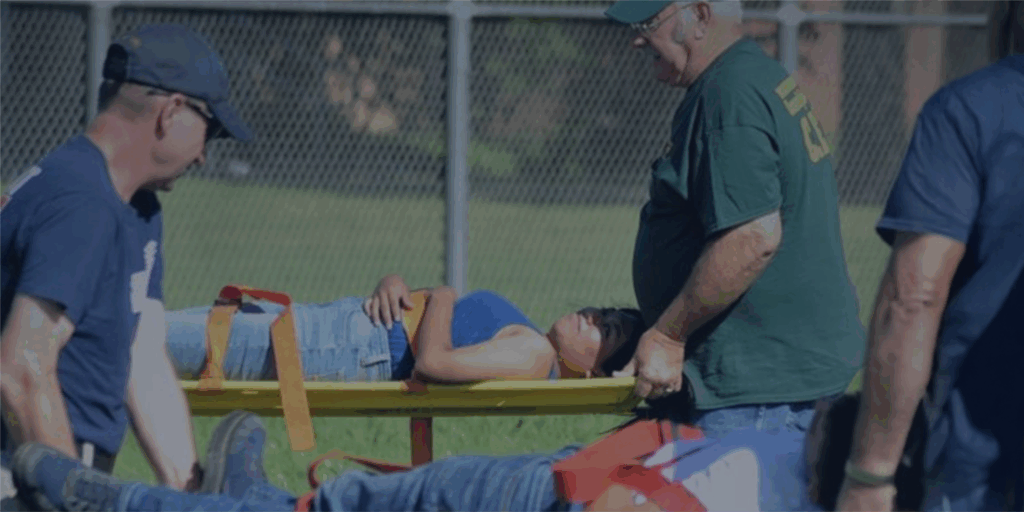
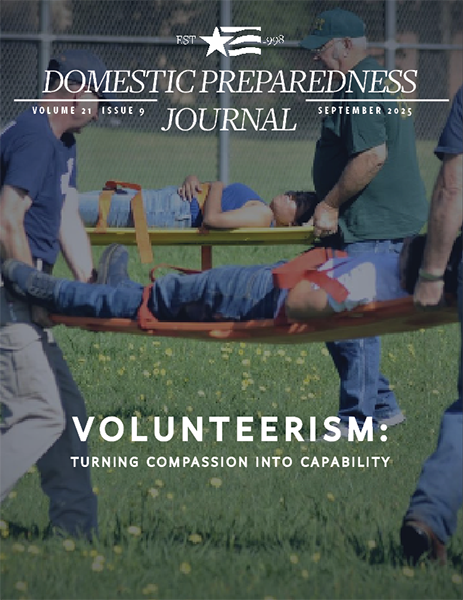
Editor’s Note: Volunteers—A Necessary Force Multiplier